Rainbow Laces In Review

Sports Media LGBT+ network lead Jon Holmes looks back at the campaign’s 2018 activation and picks out 10 highlights…
The risk of a rainbow being seen was enough for Iran’s cultural decision makers to take the Premier League off
The state broadcaster, IRIB, paid out for TV rights in the summer after Alireza Jahanbakhsh’s transfer to Brighton. But even with the poster boy of Iranian football out of action due to injury, fixtures such as the triple-header of derbies on the first Sunday of the month and the Manchester United vs Arsenal match that followed in midweek would have pulled in big audiences in a country of over 80m people.
However, the league and clubs’ support for Stonewall’s Rainbow Laces campaign amounted, in the view of Iran’s authorities as reported by BBC Persian, to be “promotion of homosexuality”. Any coverage, live or recorded, was put on hiatus until the PL’s branding for equality and diversity was packed away.

At the start of the campaign activation period, I wrote that same-sex love was still illegal in over 37% of world nations, a list that includes Iran. Since then, the percentage has increased, with Chad becoming the 74th out of 195 countries to enact an anti-gay law. The Premier League is broadcast in over 200 territories globally; its reach takes Rainbow Laces to a great many places where society, let alone sport, does not even indulge talk of LGBT inclusion, let alone allow a symbol for it to be shown.
To me, that will always be the most powerful function of the campaign – to provide visibility, which can be seen far beyond British shores. It’s not the purpose of football to bring about political change (as someone in the comments on any social platform will never fail to remind you), but the fact it helps to grow cultural understanding between peoples is something that makes the game truly beautiful. While some may focus on the homophobia that inevitably crawls out from under rocks kicked over by Rainbow Laces, we should also pause to celebrate the positivity which the campaign fosters.
That’s the purpose of our ‘Rainbow Laces In Review’ list. This time last year, we picked out a set of talking points, items of content, social posts and media moments that took the ‘make
Darts steps up to the oche
More than 20 national governing bodies and sports associations were on board with the campaign this year. Darts’ involvement, through the PDC, felt particularly significant – it’s only two years ago that Eric Bristow, a true legend of the sport, posted homophobic remarks on Twitter. Bristow, a much-loved figure who sadly passed away in April, publicly
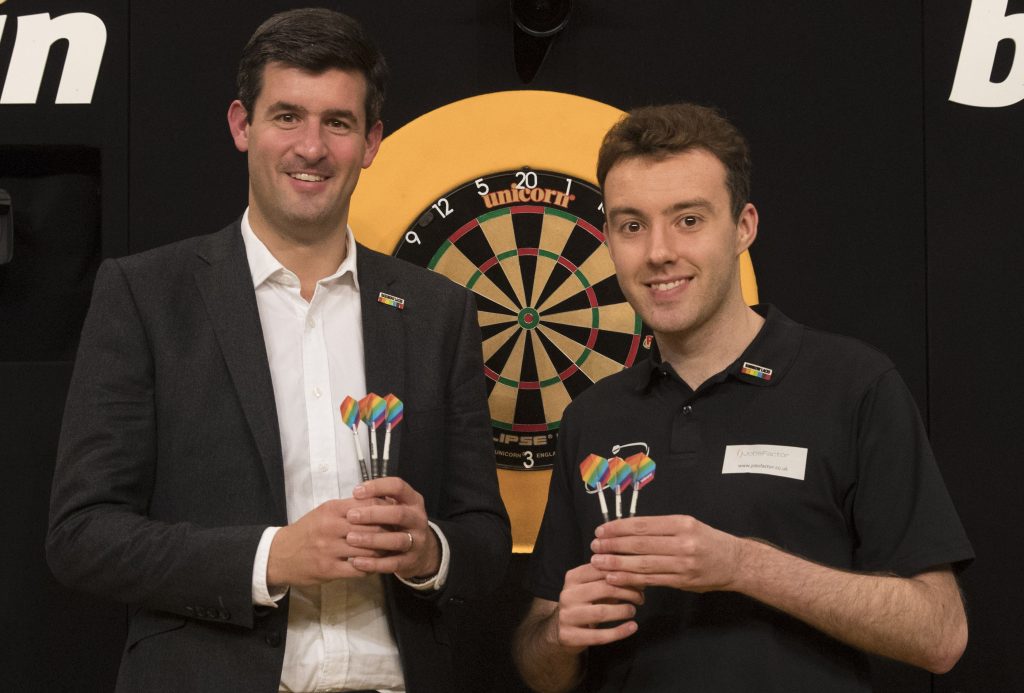
In case you missed it… Rounders England
Thomas sees ‘bigger picture’
Gareth Thomas described the reaction of world rugby to the homophobic attack he suffered – a show of solidarity from across the sport, which included the New Zealand team wearing Rainbow Laces – as “flattering and humbling”.
In an interview with the Irish Times’ Charlie Taylor, he said that he hoped all those who experience hate crime would benefit: “They have to put up with these incidents and don’t get the publicity I’ve received.” Thomas was in Dublin to speak to employees of a recruitment company, and noted how fine work done by many businesses on inclusion meant LGBT people “increasingly… feel safer in the workplace than they do in society”. Thomas is tireless in his advocacy for authenticity and the importance of empowering LGBT individuals to come out and in doing so, make their environments more inclusive. “Most people’s fears are far worse than the reality,” he explains. “You often create those fears because you have to try and justify the reasons you aren’t telling the truth.” Being true to yourself and to others in such a way is certainly difficult, and for many, circumstances make it seem impossible. Yet no
In case you missed it… Gareth Thomas was a grateful recipient of a Harpenden RUFC rainbow jersey – the Hertfordshire club’s special kit was also captured in the superb picture below by The Times’ chief sports photographer, Marc Aspland.
Being an ally? Piece of cake
A simple gesture by an ally of just wearing rainbow laces or supporting the campaign visibly and vocally tends to go a long way with LGBT people – it’s noticed, appreciated, and valued. Gary Neville donning a rainbow captain’s armband at the Emirates for Sky Sports’ Super Sunday coverage;
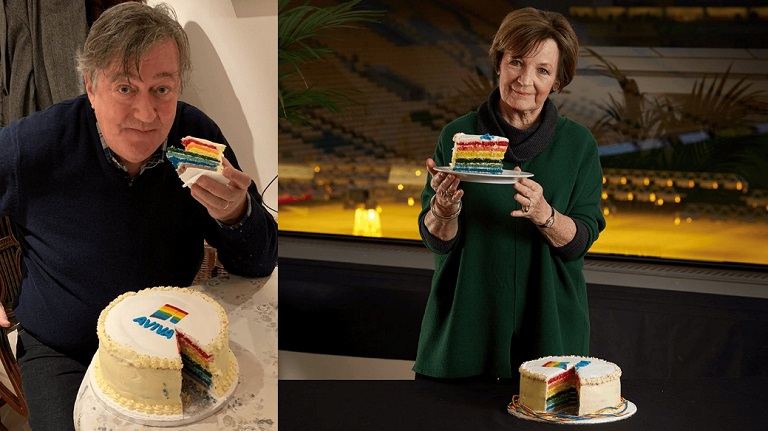
In case you missed it… Norwich fans unveiled a Justin Fashanu tribute ‘surf banner’ at Carrow Road, while Proud Canaries founder Di Cunningham was among the EFL fans featured in short films about supporters who are LGBT.
Victory for ‘The First Ever’
What could be more empowering than an athlete who’s LGBT making history during the campaign period? Aberdeen’s Kristen ‘The First Ever’ Fraser is the first Scottish woman to ever win a Commonwealth boxing title, and she did it in late November wearing rainbow laces in her boots and a custom rainbow kit. After her success, she told Sky Sports…
I support the campaign because I’m out. I’m gay, I’m married… I don’t care who knows that ‘this is me’. The reaction to my kit on the night was that it was awesome visibility.
Fraser has ambitions to go further in the sport, and her confidence is infectious – she
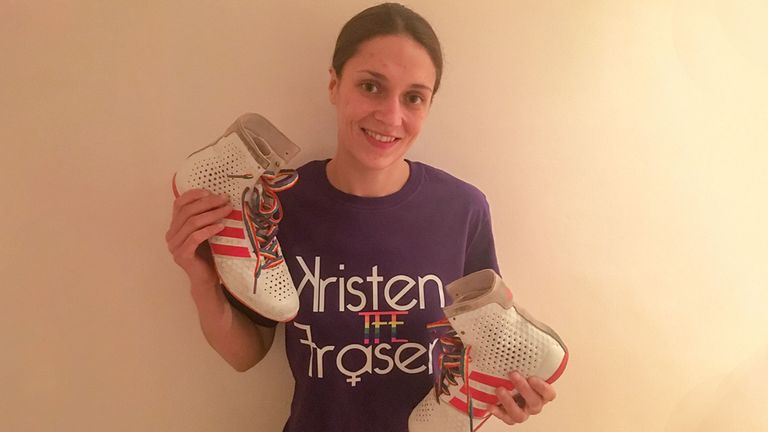
In case you missed it… another of our
Sonya squares up!
“I was just like this MMA fighter chick. I felt so out of my comfort zone.” WWE’s Sonya Deville was still using her real name, Daria Berenato, in the ring when she stepped out on the Tough Enough reality show back in 2015. Asked by the judges if she was in a relationship, she had to make one of those snap decisions so familiar to gay, lesbian and bi people – do I share my truth with these people who don’t really know me? She did, and on live TV too. Reflecting in a new interview with Sky Sports, she declared herself “grateful” to have the opportunity, excitedly collecting a pair of Rainbow Laces too.

Later on Twitter, where she offers advice to young LGBT people, she wrote: “This means a lot to me, love is love, we are all one and spreading this message far and wide is so important.” Sonya’s interview was subsequently picked up by several US publications, including the New York Post, thus taking the message far beyond even her own social reach of 600,000 followers. Her slogan is “Put your hair up and square up” – like Kristen Fraser, it’s the kind of attitude we need more of.
In case you missed it… the great Parrow, who’s done so much for LGBT visibility in wrestling in 2018, has been entertaining huge crowds out in Japan in recent weeks. He celebrated a year since coming out with a post on Twitter in which he featured alongside his tag-team partner, Odinson.
Judgements, judo… and just feeling ready
Boxing, wrestling… and now judo. Combat sports really came to the party for Rainbow Laces this year, and again it was inspirational women whose stories had a particularly big impact. Kate Howey is a two-time Olympic medallist, Team GB flagbearer, and has an MBE to her name. Yet until writing a blog post for the British Judo website about her experiences of being a lesbian in the sport, she had never discussed that part of her life publicly. “I think about it differently now,” she wrote. “It’s so important to have acceptance in yourself about your sexuality. Only then can you feel comfortable to talk about it.”
Another judoka, Kate Green, and Stefan Newbury, British Judo’s performance administrator
In case you missed it… Tom Daley, arguably Britain’s most famous LGBT Olympian, is now fully in the swing of fatherly duties alongside his husband, Dustin Lance Black. Black has recently been helping to educate people about surrogacy – read his Guardian interview with Zoe Williams here.
Courtney serves rainbow realness
I love when Rainbow Laces crosses over into LGBT culture – it doesn’t happen very often, as the boundaries of
In case you missed it… Courtney Act’s dating reality TV show ‘The Bi Life’ is drawing to a close on E! Contestant Michael Gunning, who hopes to swim competitively for Jamaica at the Tokyo 2020 Olympics, spoke to Sky Sports about his experiences of being LGBT in and out of the pool.
‘Mike Sholly! On the volley!’
Attendance: 1,054. Acceptance: Total. Ultimately, the size of the crowd mattered little at Wembley on the Friday night when, at the invitation of the FA, Stonewall FC and Wilberforce Wanderers made history at the national stadium.
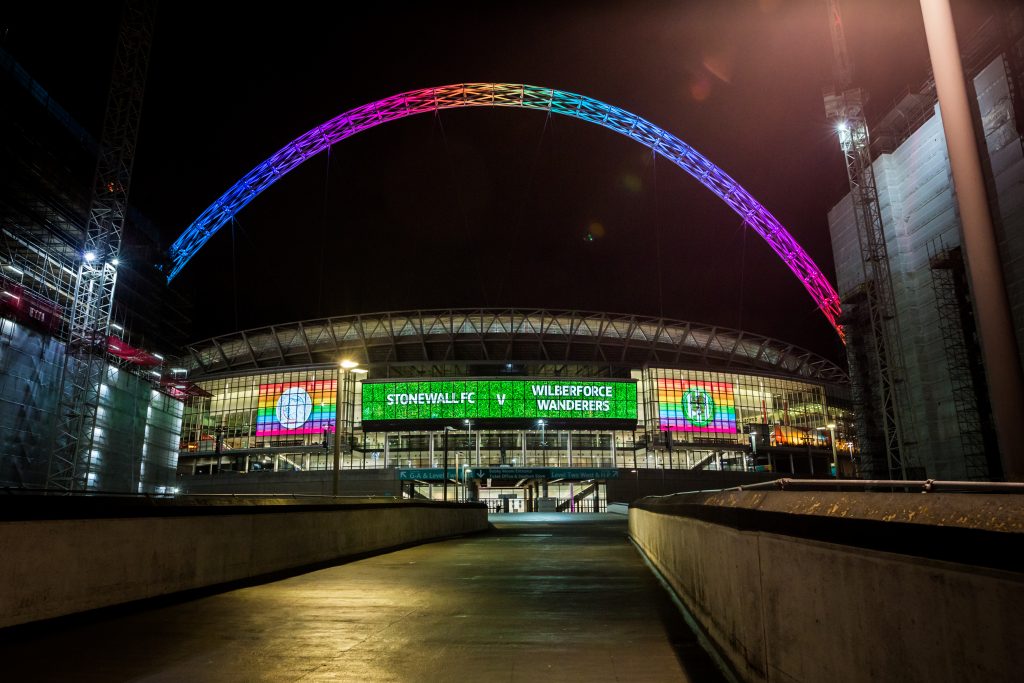
It would have been great to throw the gates open ‘For All’ to attend but alas, we live in a day and age when that’s not safe or possible logistically. But the crowd chants showed how connected the fans were to these players (and when else would you hear ‘stand up if you love the D!’ at Wembley), Sky Sports News got live touchline in-game access, and in a pre-match discussion, Stonewall FC founder Aslie Pitter brought a tear to the eye as he spoke of the progress made since the club’s early days. On the pitch, Mike Sholly’s exquisite volley saw Stonewall complete a turnaround – they went on to win 3-1. It was all played out beneath the rainbow arch. “Tonight was much bigger than Stonewall FC – it was an incredible platform for the LGBT community,” said Sholly
In case you missed it… BBC Sport’s Football Focus feature on Stonewall FC and the match at Wembley was a must-see – catch it here, or in the full show on iPlayer (from 37m in). Aslie Pitter is also a guest on the BBC’s LGBT
Allow us a Sports Media LGBT+ moment…
I had to pick out Adam Crafton’s appearance on Sky Sports‘ Sunday Supplement show at the start of the month. He talked with great insight about coming out in the sphere of men’s professional football – the prospect of doing so for a young player who is gay, and why it would be so different compared to Adam’s own experience of being out as a young journalist. “We’re fortunate in our industry… there’s now a group of LGBT sports journalists doing really good work,” he said.
It’s in no small part to the support and enthusiasm of people like Adam that Sports Media LGBT+ even exists; any work we’re able to do gains traction through the backing of our network members and our partnerships. Listening back to the podcast (the Rainbow Laces chat starts just after the 34m mark), you can sense how his fellow
In case you missed it… another of our members, David Mooney, put together an excellent package on Rainbow Laces for the Blue Moon Podcast, speaking to Manchester City fans about the campaign and its impact – listen here from about 23m in.
The tifo that really took off
For reasons explained above, citizens of Tehran never got to see the Watford fans’ mosaic before kick-off in the game against Manchester City.
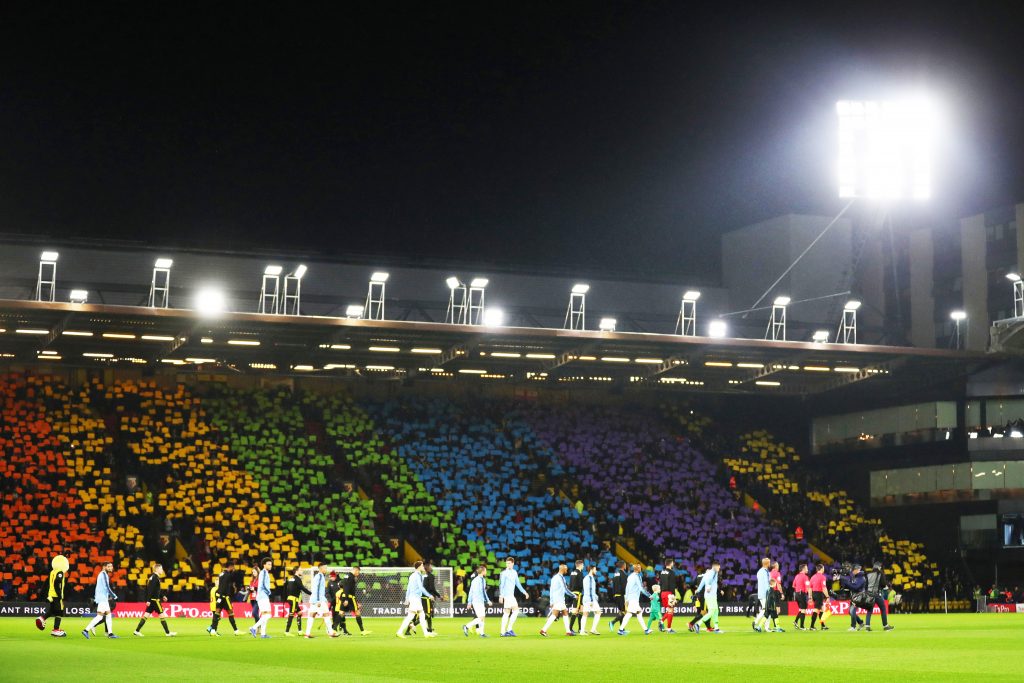
What a shame – it looked spectacular, and millions of people around the planet will have applauded it. Millions more may not have felt able to do the same, or to even talk positively of its impact – but they will have felt the warmth and solidarity of the message many miles from Vicarage Road. The Premier League’s strong show of support for Rainbow Laces came towards the end of the activation period, following on from the EFL and women’s football. Fan films published, newspaper wraparounds printed, stories shared on social, and with the #RainbowLaces hashtag helping to keep everyone informed… our national game enabled campaign conversations at every level, from grassroots to elite.
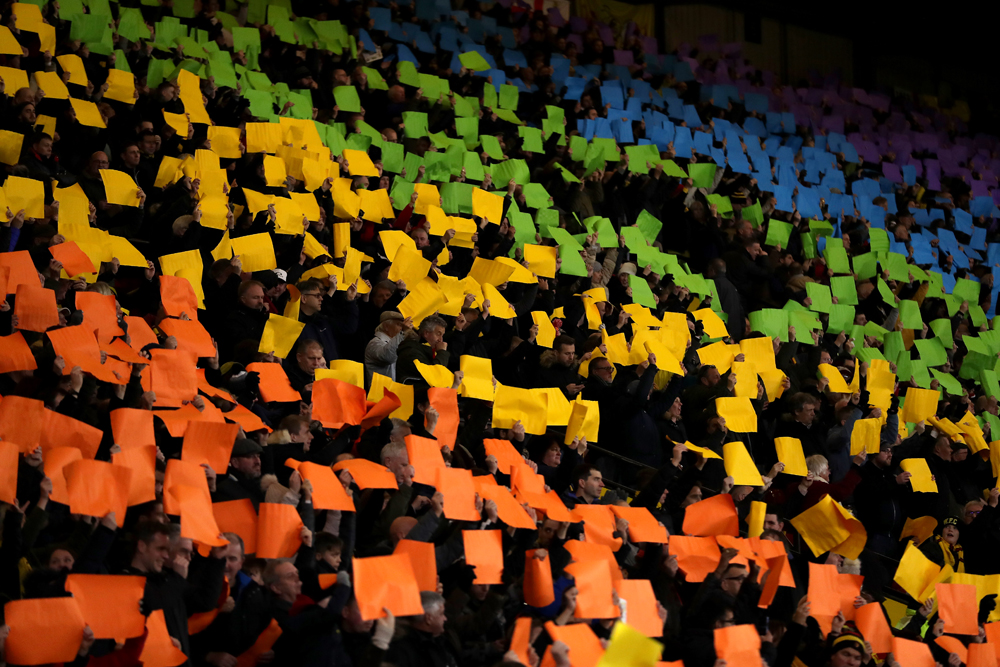
The rainbow tifo was a collaboration between LGBT people and allies, with Watford’s Proud Hornets and The 1881 working together on a club-backed project that was organic, not ostentatious. Anyone tuning in to see the Premier League champions play football couldn’t have missed the mosaic – a display of pride and passion.
In case you missed it… Proud Baggies, West Brom’s LGBT fans group, were particularly proud to see Albion players warming up in T-shirts with their logo on before their match against Brentford at The Hawthorns.
Now over to you…
What were your thoughts on Rainbow Laces in 2018? Leave a reply below to let us know your favourite moments and stories, and how you feel the campaign can keep growing in 2019…


